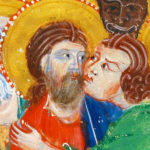We run our website the way we wished the whole internet worked: we provide high quality original content with no ads. We are funded solely by your direct support. Please consider supporting this project.
Is God Good?
This reflection by David D. Flowers seemed like a good addition to Greg’s recent blogs on free will. Here David talks about the problem of evil and how it is that we can call God “good” in light of a world full of evil. He even quotes Greg extensively.
From the blog post:
In orthodox Christian perspective, the cross of Christ is the climax of incarnation. God displays the depths of his love for all of creation by bearing the ultimate consequence of the evil our free will has brought into the world.
We also learn that God’s omnipotence doesn’t look like that of Zeus, king of the gods. The power of God is revealed in Jesus’ giving of his life by his own free will for the purpose of reconciling a broken humanity.
Category: General
Tags: Free Will, God, Nature of God, Picture of God, Problem of Evil
Related Reading

Did God Predestine Judas to Betray Jesus? (podcast)
Greg talks about the role Judas played in the crucifixion of Jesus and speculates about his potential for good. Episode 516 http://traffic.libsyn.com/askgregboyd/Episode_0516.mp3

When God Endorsed Polygamy
We often find God acting as if he supports things we know, by other means, that he does not. For example, though his ideal was monogamy, it’s clear in the biblical narrative that, once God decided to permit men to acquire multiple wives and concubines, he was not above bearing the sin of his people…

Making God in Our Own Image
In this video, Greg introduces the idea of how we make God into our own image instead of allowing God to define himself through the revelation of Jesus. In an interview performed by Travis Reed from theworkofthepeople.com, we have a basic, quick introduction to a core element of Greg’s theology. This is a great piece to…

Is God All-Powerful?
I want to answer yes and no. God is all-powerful in the sense that God originally possessed all power. Before Creation, God was the only being who existed, and thus had all the power there was. He could do anything, and nothing opposed Him. But with the creation of free creatures, I maintain, God necessarily…

Performance Christianity—Getting Over It
Image by Martijn Braat via Flickr Many Christians feel empty, tired, and apathetic, if not positively angry, though few express this out loud because it’s usually taboo to do so within Christian circles. These believers often fault themselves for their shortcomings when, in fact, it may be that their lack of zeal for the things of God…

Free Will: What does Quantum Theory suggest?
Bet you didn’t think we’d be going here. Greg discusses how quantum theory supports the idea of free will.

